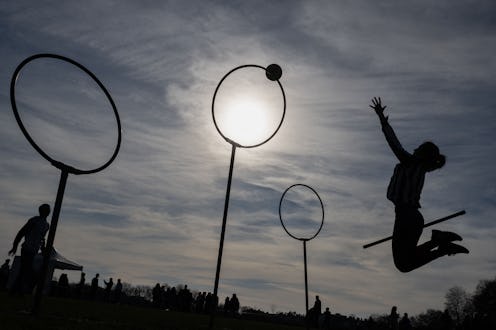Muggles
Quidditch Has Changed Its Name Amid Ongoing J.K. Rowling Controversies
Just in time for next year’s World Cup.

As any self-respecting Potterhead will know, much of the social calendar at Hogwarts revolves around cheering on an airborne sport involving super-speed broomsticks, chucking bludgers at each other, and chasing around a flying winged ball called a golden snitch. A fictional invention, Quidditch first appeared in the original Harry Potter books, but a Muggle version of the game has become popular at universities and college campuses after being adapted for land in 2005. And now, 25 years on from the release of J.K. Rowling’s debut novel Harry Potter and the Philosopher's Stone, Quidditch is getting a new name: Quadball. The sport’s new title refers to the number of balls in play during a game, as well as the number of different player positions.
Back in December last year, two of the sport’s biggest governing bodies hinted that there could be a name-change for Quidditch in the works — citing issues securing “sponsorship and broadcast opportunities” while the sport’s name is trademarked by Harry Potter’s film production company Warner Bros. Now, however, the International Quidditch Association has cited a second reason – JK Rowling’s “anti-trans positions.” The Harry Potter author has been accused of transphobia, and has been criticised for platforming the work of controversial anti-trans campaigners and posting harmful tweets and blogs. Rowling denies the allegations.
A mixed-gender contact sport, the real-life version of Quidditch currently has an inclusive reputation. As part of the rules, a team must not have more than four players who identify as the same gender on the pitch at the same time, aside from the seeker. What’s known as the “four maximum” rule doesn’t just ensure diversity on the pitch, it also makes sure non-binary players are welcome within this framework, too.
That said, a spokesperson for U.S. Quidditch and Major League Quidditch told The New York Times that the game’s association with Rowling had created issues recruiting new players. “We’ve tried to be clear that it’s both reasons,“ Jack McGovern explained, also referring to other issues around the sport’s trademarked name. “We did not intend to give a value judgement about which reason was more important than the other.” The organisations have now rebranded to U.S. Quadball and Major League Quadball, respectively.
“In less than 20 years, our sport has grown from a few dozen college students in rural Vermont to a global phenomenon with thousands of players, semi-pro leagues and international championships,” said Mary Kimball, the executive director of U.S. Quadball, in a statement. “Our organisations are committed to continuing to push Quadball forward.”